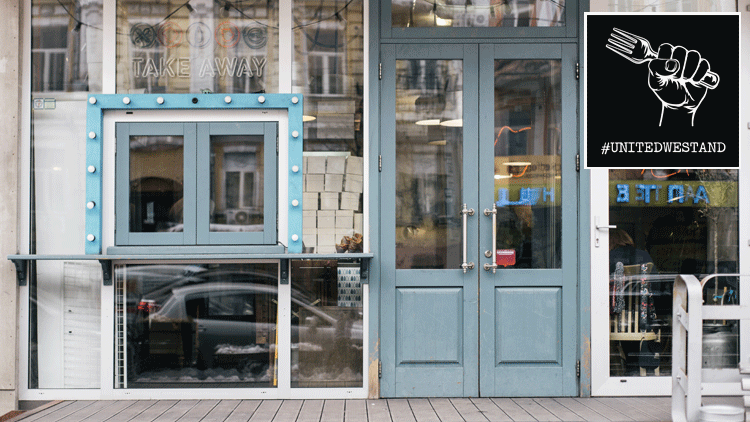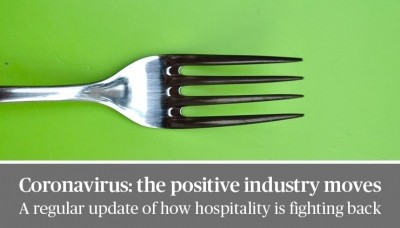How to approach property and insurance during the Coronavirus crisis

Though the Government’s help with business rates, staff, grants and loans have been broadly welcomed by the hospitality sector, operators large and small are still faced with the fundamental problem of having costs going out and very little (if any) income coming in.
With business rates and staffing now eased to some extent, principle among these outgoings is rent. All the Government’s measures to protect jobs and the economy will be for nothing if thousands of businesses lose their premises or go bust because they can’t meet their rental obligations.
Which is why - following intense lobbying from the hospitality industry - the Government has introduced a much-needed lease forfeiture moratorium that will prevent landlords from repossessing commercial premises if businesses are unable to pay their rent.
The move has come as a huge relief for many in the industry. While some landlords had already agreed new terms with tenants - such as rental holidays and switches to monthly payments - others were less willing to pay ball, especially smaller landlords that need rental cash to service their own financial obligations.
London Union’s Jonathan Downey who, alongside trade body UKHospitality, has been one of the loudest voices calling for a lease forfeiture moratorium, described the move as “brilliant, brilliant, brilliant”. “Business owners will now have some proper time to work out how best to push through this and bounce out the other side,” he says.
UKHospitality CEO Kate Nicholls, says the move had eased financial pressure on restaurants and freed up cash for supporting employees.
“With the next pending rent day falling this Wednesday, this move by the Government is hugely welcome and will help to protect jobs across the sector,” she says. “The industry has been pressing ministers for several days to act on this crucial issue, and we are thankful they have responded positively to our concerns.”
“While this removes the immediate cashflow pressure of quarter rent day, the Government has made clear that the negotiation is now with lessee and landlord to reach a solution on payment. Hospitality businesses want to work with landlords constructively during this crisis to find solutions and the hope now is that they enter into meaningful discussions on the optimum way forward.”
How long will be the forfeiture moratorium last?
The forfeiture moratorium will last for a minimum of three months, but there is the chance it could be extended in the future. It is not free money however, and the Government says that landlords are still owed rent and - should this not be paid once this clause of the legislation has elapsed - will be able to claim for forfeiture. The moratorium will also only apply to the collection of rent, so won’t cover things such as insurance (more on this later on) and other landlord-charged costs.
Brindisa Kitchens co-owner and restaurant financial consultant and accountant Ratnesh Bagdai says that he has advised his clients to withhold quarterly rent payments for April, May and June.
“The majority of our landlords for Brindisa Kitchens are helpful,” he says. “But it’s important to remember that this is just support with cashflow for the time being. As it stands, we still need to pay them within the next year or so perhaps. The idea of paying rent during a period we can’t trade is very painful indeed and – frankly - not possible.”
“For us, the next three months is about protecting people’s health and our cashflow. Not having that cash leave our bank account is a big help. As we get into May and June, we will start having conversations about landlords sharing some of that pain, but it’s not a conversation for now.”
Are landlords likely to offer further support?
Some certainly will take a long term and more sympathetic view. Larger landlords are far better placed to support the industry because they often draw rental incomes from multiple streams, including offices and residential.
But as Camilla Topham - co-founder at restaurant property agent Distrkt – explains, there are many different types of landlords that have a wide range of challenges. “For example, for many listed REITs and pension funds the rents received pay people’s pensions ultimately. The biggest challenge that landlords are also facing is the unknown timescale of when normality may resume.”
“What we can see with our clients - who are the London estates - is that they understand the gravity of the situation and are working with operators, particularly those that have worked hard on their estates in terms creating vibrant dining scenes,” she continues.
“We have seen landlords like Argent and TFL offering a three-month rent holiday to their tenants. Sadly, there have also been reports of a minority of landlords not engaging.”
How should restaurants approach negations with landlords?
Politeness and respect will go a long way, advises Ted Schama, a director at restaurant property agent Shelley Sandzer. Openness and transparency are important too, he says. Bear in mind that with the majority of operators now enduring an enforced closure it is a very unreasonable landlord that demands cash now knowing restaurants have no cashflow.
“Keep your landlord updated about your trading situation,” advises Distrkt’s Topham. “What each operator will need to request of the landlord will very much depend on their individual circumstances. Communication is key and landlords and tenants have to work together at this incredibly difficult time. The length of time that hospitality businesses will be closed remains unknown, so an open and honest dialogue is the best approach.”
The forfeiture moratorium announced this week by the Government will protect people for at least three months and tenants that have a good track record in paying rent and complying with the other requirements within the lease have a good chance of negotiating further with landlords, says Shelley Sandzer’s Schama.
“It’s very important to make it clear to the landlord that you do intend to pay it back as soon as you can," he adds. "That’s an important statement. If you do end up in court, you might have to prove there was a positive intention and a plan to pay."
What will be the medium-term effect of the Coronavirus pandemic on the UK property market?
While there is currently a lot of uncertainty surrounding the Coronavirus crisis, one thing that is for certain is that it will shake up the restaurant property market. Major restaurant brands that were struggling prior to the crisis are going to struggle to secure loans because the banks will be looking closely at their historical trading figures. Those that do manage to secure loans may struggle to pay them back.
“Sadly, some of the businesses that survived the CVA process over the past few years are vulnerable. If you were already exposed and highly leveraged ahead of the crisis it’s going to be tough,” says Schama. Ultimately, this will lead to more vacant properties and a commensurate drop in premiums and rents, which will potentially lead to good value opportunities for established operators that have managed to come out of the crisis in relatively good shape alongside emerging operators.
What about insurance?
Sadly, very few hospitality businesses will be covered for the business interruption caused by the Coronavirus. Generally speaking, insurance companies don’t provide cover for events that will affect every single business in the country - including war and pandemics like the Coronavirus - for the simple reason that they would go bankrupt if they had to pay out.
The Government’s declaration of COVID-19 as a notifiable disease does not mean it is covered under an insurers’ wording. However, larger companies and multi-site operators may have purchased an extension to their cover for closure due to any disease. In this instance, the enforced closure that came into effect last week might well trigger a claim.
A policy may also be extended to cover Denial of Access including infectious diseases. Such extensions will be subject to insurers’ different terms and conditions. “In other policies (though less common) there might be unspecified infectious disease cover where the insurers do not specify the diseases covered,” says Matthew Dewen, a director at specialist insurance broker Full Time Cover.
“Where there is cover (named or unspecified) and the businesses, trade or operation incurs a loss resulting from interruption of or interference with business at the premises due to an outbreak of an infectious disease, then the policy may respond.”
Though probably a bit of a longshot, some operators could look at claiming for business interruption due to damage. If a business could prove through swab tests or similar that the virus was present and the premises had to close for a deep-clean this may trigger the business interruption part of the policy.
How can I reduce my insurance costs?
Clearly a closed business has different insurance needs to one that is open. Dewen suggests that those businesses that have closed their doors should ask insurers to return premiums pro rata for the duration a venue is closed. For those that pay monthly, he recommends asking to suspend payments.
Dewen also believes that insurers need to be flexible when it comes to renewals, price increases and payments. “The last thing anyone wants is for industries to disappear. Insurers need to be pragmatic and understand that these are clients at the end of the day. There needs to be flexibility, and when it comes to renewals. And insurers should at least be considering premium reductions,” he says.
Another potentially helpful thing that has been mooted by the insurance sector is an automatic extension to renewal dates due to the practicalities of negotiating and renewing a policy on time during a nationwide crisis.
What do people that own their premises need to bear in mind?
The minority of operators that own all of or some of their sites must ensure they let insurers know if any of their sites are going to be closed or risk voiding their insurance. Unoccupied property clauses typically kick in at 30-days on most policies. Vacant properties are at risk of fire and squatters, so it’s very important for businesses to ensure they are covered. For most leaseholders and other types of tenant the responsibility for this will be with the landlord.
#UnitedWeStand has been created by William Reed hospitality titles BigHospitality, Restaurant magazine and Morning Advertiser and is supported by Arla Pro, McCain and Unilever Food Solutions.





















